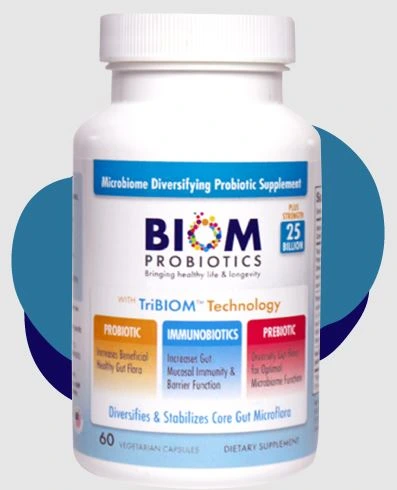Picture this: Trillions of tiny soldiers fighting on the front lines daily, guarding your health fortress against harmful invaders that can cause discomfort or illness. What if we told you those soldiers are already at work inside your body? They’re called probiotics and work tirelessly to keep your gut in shape. These unsung heroes are integral to your body’s defense mechanism – a crucial detail many overlook. This comprehensive guide delve into probiotics, shedding light on how these microscopic superheroes can empower your health like never before. So fasten your learning belts; it’s time to unlock the benefits of probiotics!
Probiotics are live microorganisms that provide a range of health benefits to the host when consumed in adequate amounts. They work by improving the balance of good bacteria in the gut, which can be disrupted by factors such as antibiotics, stress, and poor diet. This balance is important for optimal digestive health, immune function and overall well-being. Probiotics can be found in fermented foods like yogurt, kefir, and kimchi, as well as dietary supplements. Consult your healthcare provider before starting any new supplements or making significant changes to your diet.
Understanding Probiotics
Probiotics are live microorganisms that can have health benefits when consumed or applied to the body. These microorganisms are commonly found in fermented foods such as yogurt, kefir, and sauerkraut, as well as in dietary supplements and beauty products. While probiotics are often associated with gut health, they can also impact the body’s overall well-being.
Many individuals who incorporate probiotics into their daily routine report feeling better overall. This may be attributed to the fact that probiotics help maintain a healthy balance of bacteria in the gut, which in turn affects other bodily functions.
According to recent research, this is not a far-fetched idea. Studies have shown that certain strains of probiotics can improve markers of immune function, ease symptoms of anxiety and depression, and even boost skin health by reducing inflammation. Sluggish digestion? The right combination of probiotics may be the answer for you.
Think of your gut like a garden – just as weeds can overtake flowers if left unchecked, an unhealthy balance of bacteria in the heart can cause problems throughout the body. Probiotics can act as a tool for maintaining that balance and keeping things thriving.
Now that we have a basic understanding of probiotics and how they work within our bodies, we’ll take a closer look at different probiotics and their potential health benefits.
What are Probiotics
As mentioned earlier, probiotics are live microorganisms found in certain foods or taken in supplement form that provide potential health benefits such as improving gut health and immunity. There are many different probiotic strains; however, two groups stand out: Lactobacillus and Bifidobacterium – which represent some of the most commonly studied probiotics.

For example, Lactobacillus bacteria produce lactic acid, which helps ferment foods and supports overall gut health. On the other hand, Bifidobacterium species have compounds that may help protect against harmful bacteria and stimulate the immune system.
While there’s no denying that probiotics can provide health benefits, there is an ongoing debate about how effective they are at treating specific conditions. Some studies have shown that supplementing with certain probiotics can improve symptoms of digestive issues such as bloating and constipation, while others have found little to no benefit. Still, other research has suggested that different strains of bacteria can be more effective in some people than others.
That being said, one area where there is growing evidence of probiotic use is in the realm of immune function. Certain strains have been linked to improved antibody response while reducing inflammation, which has many negative health implications.
In the next section, we’ll dive deeper into how incorporating probiotics into your diet or supplementation regimen can yield various health benefits.
- According to a 2012 National Health Interview Survey, around 4 million U.S. adults had used probiotics or prebiotics in the past 30 days.
- The consumption of probiotics may help improve symptoms of certain conditions such as IBS (Irritable Bowel Syndrome) with approximately 50% reduction in symptoms, according to a meta-analysis study published in the American Journal of Gastroenterology.
- A systematic review and meta-analysis from 2017 suggest that using probiotics can lead to a statistically significant reduction in the risk of antibiotic-associated diarrhea by about 60%.
Why Do We Need Probiotics
Probiotics are an essential part of our body’s microbiome, a community of beneficial bacteria and yeasts that live in and on our bodies. The microbiome plays a vital role in maintaining our overall health, with the gut being the most common location linked to beneficial microbes. Ingesting probiotics can help you maintain a healthy balance of microbes, supporting immune function and controlling inflammation.
Many factors in today’s society, including poor diet, stress, pollution, and excessive antibiotic use, can negatively impact our microbiome and reduce the number of beneficial microorganisms. This imbalance in the gut flora can lead to many health issues, such as diarrhea, constipation, IBD, IBS, yeast infections, urinary tract infections, gum disease, lactose intolerance, eczema, upper respiratory infections, and sepsis in infants. Hence we need probiotics to re-establish the healthy balance of microbes in our body.
A friend of mine had been facing severe bowel discomfort for months and tried every remedy possible without any success. One day her doctor recommended she incorporate probiotics into her daily routine. Within weeks of adding a high-quality probiotic supplement to her diet plan and eliminating certain foods that were causing inflammation, my friend began experiencing significant improvement in her gut health.
Various research studies indicate that probiotics can enhance colon health by improving digestion and absorption of nutrients. A randomized study conducted involving 40 people found that consuming Lactobacillus fermentum significantly improves gastrointestinal discomfort symptoms compared to the control group.
Furthermore, another study reported that probiotics could improve mood disorders such as anxiety and depression, thus boosting mental health too.
The National Health Interview Survey (NHIS) states that American adults have quadrupled their use of probiotic supplements between 2007 and 2012, showing that people recognize the importance of probiotics in their diet.
However, one point to consider is that everyone’s microbiome composition is unique, and what works for one person might not work for another. Some studies have reported a less effective outcome of probiotic use on some individuals than others.
It’s like taking antibiotics; they’re helpful medications but affect everyone differently. Some restore the patient’s health, while others experience probiotic resistance, where the medicine no longer fights off the infection.
Food and Supplement Sources of Probiotics
There are several ways to increase beneficial microbes in our body, including fermented foods and drinks like yogurt, pickles, kombucha, and kefir. Fermented food is an excellent source of bacteria that can positively impact gut health. These foods already contain pre-existing bacteria that can help repopulate your digestive system with beneficial microbiota.

However, obtaining sufficient amounts of probiotics through food alone may not be possible or practical in all cases. In such circumstances, dietary supplements can effectively maintain optimal levels of beneficial microorganisms in the gut. Probiotic supplements are available as capsules, tablets, or powders. When looking for supplements, you must search for high-quality products from reputable manufacturers and consult your healthcare provider before beginning any supplement regimen.
People resort to supplementing because they don’t enjoy the taste/ texture of fermented foods like kimchi or sauerkraut. When my sister was undergoing chemotherapy treatment, her palate changed drastically, making her unable to tolerate consuming certain foods she used to enjoy. As a result, her doctor recommended adding probiotics supplements into her daily routine to reintroduce beneficial strains into her nutrition easily.
A pilot study involving twelve healthy adults found that probiotic supplement consumption for two weeks significantly improved the abundance of gut microbial species’ indicating a strengthening of the gut microbiome.
For some individuals, a high dose of probiotics can cause mild side effects such as bloating, gas, and stomach discomfort. It’s best to start with fewer probiotics if you encounter these symptoms.
It’s like introducing new foods into your diet plan; your body needs time to adjust. You might experience temporary discomfort during the process.
- Increasing beneficial microbes in our body is essential for maintaining good gut health. Fermented foods and drinks like yogurt, pickles, kombucha, and kefir are excellent sources of pre-existing bacteria that can positively impact gut health. However, supplementing with probiotics can be an effective approach to maintaining optimal levels of beneficial microorganisms in the gut where obtaining sufficient amounts through food alone is not possible or practical. Searching for high-quality products from reputable manufacturers and consulting with your healthcare provider before beginning any supplement regimen is important. While some people may experience mild side effects, starting with a lower dose of probiotics can help the body adjust to the change and reap the benefits of introducing beneficial strains into one’s nutrition routine.
Probiotic-Rich Foods
Probiotics are good bacteria and yeast that can benefit your health in various ways. While you can take probiotic supplements, you can also increase your intake of probiotics through food sources. Below are some examples of probiotic-rich foods:
Yogurt is one of the most commonly consumed probiotic-rich foods around the world. Yogurt contains live cultures commonly known as Lactobacillus bulgaricus and Streptococcus thermophilus. These good bacteria help improve digestion and boost immune function.
Kefir is a fermented milk product similar to yogurt, but it has a thinner consistency and even more potent bacterial strains. It provides beneficial yeasts and several strains of bacteria, such as Lactobacillus acidophilus and Bifidobacterium bifidum.
Sauerkraut is made from fermented cabbage, rich in lactic acid bacteria such as Lactobacillus plantarum and Lactobacillus brevis. This vegetable promotes gut health and reduces inflammation.
Miso is a traditional Japanese seasoning made from fermented soybeans. It’s usually used to flavor soups, dressings, and marinades. Miso contains probiotic bacteria that stimulate digestive health.
Tempeh is a protein-rich product made from fermented soybeans that originated in Indonesia. Like other soy-based products, tempeh contains good bacteria called Bacillus coagulans which promote gut health.
Including these probiotic-rich foods in your diet may help improve your digestive system, reduce inflammation, and support a healthy immune system. However, remember that not all fermented foods contain live active cultures. To ensure you’re getting sufficient probiotics, read the label on your food product.
While some people prefer to obtain their probiotics from food sources, others find it challenging to consume sufficient amounts and turn to supplements. Let’s explore more about probiotic supplements in the next section.
Probiotic Supplements
Probiotic supplements come in various forms, such as capsules, powders, and even gummies. They contain an abundant supply of live active cultures that benefit your health. These supplements provide an easy way to maintain a healthy gut microbiome. Here’s what you need to know:
The strains and dosages must be appropriate for your needs to ensure that a supplement positively impacts your health. For example, if you’re struggling with IBS or other digestive issues, you may benefit from taking lactobacillus acidophilus or bifidobacterium lactis. Meanwhile, Lactobacillus rhamnosus effectively prevents urinary tract infections and reduces eczema symptoms.
Taking a probiotic supplement is like planting seeds in your garden; you must choose the right ones for optimal outcomes, adequate amounts, and good quality soil. Similarly, when selecting a probiotic supplement, pay attention to the value of each ingredient so that they function together efficiently.
When choosing a supplement, keep in mind the following:
1) Type of bacteria: Make sure the supplement contains bacterial strains proven to have positive health effects.
2) Potency: Choose supplements with high colony-forming units (CFUs) count, as this reflects the number of viable cells or microorganisms present in each dose.
3) Delivery method: Some probiotics require refrigeration, while others are shelf-stable.
It’s important to note that the FDA doesn’t usually regulate probiotic supplements, and labels can be misleading. Supplement manufacturers don’t always provide specific strains, and it’s vital to do your research to verify a product’s credibility. Before taking any supplement, talk to your doctor or health practitioner to check its suitability.
If you’re taking antibiotics, a probiotic supplement may benefit you as it can help replenish the good bacteria that antibiotics have wiped out. Recent studies have shown that taking a high-quality probiotic supplement prevented antibiotic-associated diarrhea in 42 percent of cases, even when given alongside antibiotics, compared with just 26% by giving antibiotics alone.
Health Benefits of Taking a Probiotic
Probiotics are well-known for their beneficial effects on gut health, but they also have multiple other benefits for the body. When consumed regularly and in the right amounts, probiotics can assist in maintaining the balance of good bacteria within the digestive system, boost the immune system, and even enhance mental well-being.
One of the most significant health benefits of taking a probiotic is that it can reduce the severity and frequency of diarrhea caused by antibiotics or infections. Many studies have reported that supplementing with certain probiotic strains can help prevent antibiotic-associated symptoms from occurring after taking prescribed medications. Additionally, some research has suggested that regular consumption of probiotics may even promote weight loss and improve digestion issues such as constipation.
Probiotic supplementation may also have anti-inflammatory properties due to its potential ability to decrease inflammation-inducing cytokines levels in your body. This includes reducing inflammation associated with inflammatory bowel disease (IBD), rheumatoid arthritis, and eczema.
While much evidence supports the health benefits of probiotics, some researchers argue that scientific evidence is still limited and further investigation is required to understand how different strains affect specific conditions fully. Nonetheless, various testimonies suggest significant improvements in their overall health after taking probiotic supplements regularly.
Like how you need to regularly water a plant to ensure growth and good health, periodically consuming probiotics can nourish important bacteria within your gut microbiome and promote optimal wellness.
With so many potential health benefits continuously being researched, it’s vital to dive into one of the most significant reasons people use probiotics – maintaining an optimal gut environment.
Role of Probiotics in Gut Health
Probiotics play a crucial role in developing and maintaining a healthy gut environment. The human gut houses trillions of microorganisms, both good and bad that are vital to healthy digestion. Taking probiotics aids in establishing a balanced and diverse microbiome, which promotes optimal digestion and nutrient absorption and keeps bad bacteria in check.
For example, certain probiotic strains can produce short-chain fatty acids (SCFAs) during carbohydrate fermentation within the gut. These SCFAs act as a source of nutrition for intestinal epithelial cells, promoting cell restoration and maintaining a robust barrier between the body’s immune system and the exterior environment.
Several studies also suggest that diverse gut bacteria can positively affect various diseases’ risk levels. A lack of microbiome diversity is associated with metabolic diseases like obesity and type 2 diabetes.
On the other hand, some researchers believe there is insufficient evidence to fully understand how different probiotic strains affect specific conditions or how they interact with other components within the gut, like prebiotics.
Think of your gut microbiome as a garden, where each bacterial strain represents a different flower or plant. Just as you would plant various kinds of vegetation to create an attractive garden, feeding your gut diverse sources of probiotics can aid in creating an optimal gut microbiome environment.
Understanding how crucial probiotics are in promoting optimal digestive system function is essential for overall health. With so many potential benefits associated with probiotics utilization, such as weight management, enhanced immunity, mitigated inflammation, and stable mental well-being, it is no wonder why more people are incorporating them into their daily routines.
Probiotics and Immune Function
The immune system protects your body against harmful pathogens that cause infections and diseases. Research has shown that probiotics can help to modulate the immune system by improving the production of natural antibodies and stimulating white blood cells, which are both important for fighting off infections.
One study found that a combination of several strains of Bifidobacterium and Lactobacillus reduced the duration of upper respiratory tract infections and the severity of symptoms in healthy adults. Another study showed that supplementing with Lactobacillus acidophilus and Bifidobacterium bifidum in infants reduced their risk of developing eczema by almost 50%.
There is also evidence to suggest that probiotics can be beneficial for those with autoimmune disorders. For example, people with rheumatoid arthritis who consumed Lactobacillus casei daily for eight weeks experienced a significant reduction in disease activity compared to those who didn’t take the probiotic.
In addition, researchers have found that certain strains of probiotics can directly or indirectly affect the gut-brain axis, which may have implications for mental health and immune function. This connection between the gut and the brain is known as the microbiota-gut-brain axis, which is important in regulating stress responses and mood.
One study found that mice fed with a strain of Lactobacillus had reduced levels of stress-induced hormones in their bloodstream. Another study showed that supplementing with Bifidobacterium longum reduced depression symptoms in patients with irritable bowel syndrome (IBS).
It’s important to note that more research is needed to understand how probiotics impact immune function fully and to identify which strains are most effective for specific conditions.
While promising research supports the use of probiotics for immune health, some experts argue that the benefits may be overstated. They point out that probiotics are not a one-size-fits-all solution, and their effects can vary depending on individual factors such as age, health status, and diet.
In addition, some argue that the quality and quantity of probiotics in supplements can be inconsistent. Consumers should exercise caution when choosing probiotics and look for those backed by third-party testing to ensure they contain the strains and amounts advertised.
Despite these concerns, many people find relief from digestive issues and see improvements in immune function through probiotic supplementation. However, it’s important to be aware of potential side effects.
Potential Side Effects of Probiotic Supplementation
For most people, taking probiotics is safe and doesn’t cause any adverse effects. However, some individuals may experience mild side effects such as gas, bloating, and diarrhea. These symptoms usually subside within a few days and are more common when first starting a course of probiotics.
In rare cases, probiotics can cause serious infections in people with compromised immune systems or recently undergoing surgery or other medical procedures. This is why it’s important to talk to your healthcare provider before starting any new supplement regimen, especially if you have any underlying health conditions.
Additionally, there is concern that indiscriminate use of probiotics may lead to antibiotic resistance. Some evidence suggests that certain strains of probiotics may survive antibiotics better than others and could potentially transfer antibiotic-resistant genes to harmful bacteria in the gut.
Some researchers also argue that more research is needed to fully understand the long-term safety and efficacy of various strains of probiotics. They point out that while studies have found certain strains to be effective for specific conditions, little is known about how these microbes interact with other bacteria in the gut over time.
While concerns over safety and efficacy exist, many experts agree that probiotics can be a valuable addition to a healthy lifestyle when used appropriately. To minimize the risk of side effects, it’s important to look for high-quality supplements that contain well-studied strains of probiotics and to follow dosage instructions carefully.




